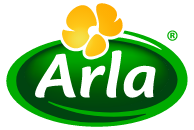Arla Foods UK
This article needs additional citations for verification. (June 2016) |
 | |
| Arla UK | |
| Type | Subsidiary |
| Founded | 2003[1] |
| Headquarters | , |
Area served | United Kingdom |
| Products | Dairy products – Lurpak, Cravendale, Lactofree |
| Revenue | |
Number of employees | 3,460[2] |
| Parent | Arla Foods |
| Website | www |
Arla Foods Ltd is a major dairy products company in the United Kingdom, based in Leeds, and a subsidiary of the Swedish-Danish Arla Foods Group.
Company profile[]
The company was created by the merger in 1980 of the British dairy group Express Dairies and the British subsidiary of Arla Foods, a Swedish Danish dairy production co operative, jointly owned by Swedish and Danish farmers. The parent company, Arla Foods Amba, initially held a 51% stake, but acquired the rest of the company's shares in April 2007.[3]
In Britain, Arla supplies milk to retailers and produces many household brands, such as Lurpak, Anchor Butter, Cravendale, Lactofree and Castello.
Name[]
This section does not cite any sources. (February 2020) |
The company name Arla is an archaic Swedish term for "early (in the morning)". Arla was originally chosen as the name of the Swedish company as Stora arla gård, "Great Arla Farm" in County Västmanland, Sweden, was one of the early founding members of today's cooperative.
History of parent[]
This section does not cite any sources. (February 2020) |
Arla Foods was formed as the result of the merger in 2000 of Swedish dairy cooperative Arla, and the Danish dairy company MD Foods in April 2000. Swedish Arla derived from an early dairy producing cooperative, originally called Mjölkcentralen (MC) founded in 1926 in Stockholm. Danish MD Foods was the result of the merger in May 1999, of Kløver Mælk and MD Foods. MD originally stood for Mejeriselskabet Danmark. The merged company is headquartered in Aarhus, Denmark.
Arla Foods is today owned by approximately 10,600 milk producers in Denmark and Sweden.
Products[]
This section does not cite any sources. (February 2020) |
Arla is the largest supplier of fresh milk and cream in the United Kingdom, producing over 2.2 billion litres of milk per year. It produces two premium milk brands: Cravendale filtered milk, which undergoes a filtration process to remove bacteria before pasteurization; and Lactofree milk, from which lactose is removed, making it suitable for most lactose intolerant people. Following the success of Lactofree milk, Arla introduced a range of lactose-free products, including cheese and yoghurt.
As well as fresh milk, Arla produces both the Lurpak and Anchor butter brands in the United Kingdom. This was not widely publicised by the company, even though the brands had been established over decades as brands for butter imported from Denmark and New Zealand respectively. Other products include fromage frais, yoghurts and the blue cheeses Rosenborg and Danish Blue. The firm also produces fruit juice.
Locations[]
The company has processing plants in England at Palmers Green (London), Stourton (Leeds), Settle (North Yorkshire) and Malpas (Cheshire), and in Scotland at Lockerbie. In January 2009, Arla ceased production at their dairy in Manchester. The company also operates the world's largest milk processing plant in Aylesbury, which was opened on 24 May 2014.[4]
Arla Foods obtained the Westbury Dairies plant in January 2016, in Westbury, Wiltshire, which has become the primary site for the production of Anchor butter and Anchor Spreadable.
Arla Foods briefly operated the Milk Link dairy in Crediton, Devon following the merger with Milk Link in 2012. However was sold in a management buyout in April 2013 with the Crediton operations being renamed as .
Compensation[]
According to the BBC, in August 2015, farmers were paid less per pint of milk by Arla than by supermarkets that buy directly.[5][6]
References[]
- ^ "Companies house report". Retrieved 7 July 2020.
- ^ a b "Companies house report". Retrieved 7 July 2020.
- ^ "Arla Foods amba acquires full ownership of UK subsidiary" (Press release). Arla Foods UK. 5 April 2007. Archived from the original on 16 July 2007. Retrieved 1 May 2008.
- ^ "Arla officially opens worlds largest liquid milk plant". 28 May 2014. Retrieved 18 July 2018.
- ^ Gregory-Kumar, David (18 August 2015). "Where should you buy a pint of milk?". BBC News. Retrieved 18 July 2018.
- ^ "Do farmers really make a loss on milk?". BBC News. 18 July 2018. Retrieved 18 July 2018.
External links[]
- Arla Foods
- British companies established in 2003
- Companies formerly listed on the London Stock Exchange
- Dairy products companies of the United Kingdom
- Manufacturing companies based in Leeds